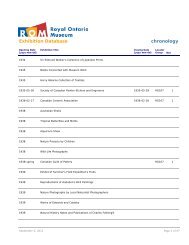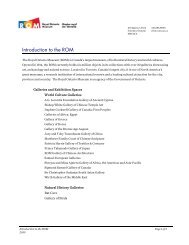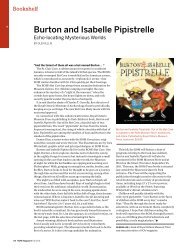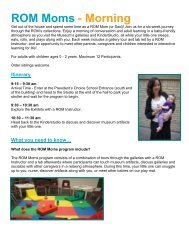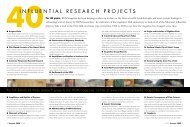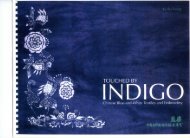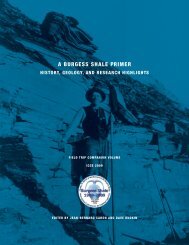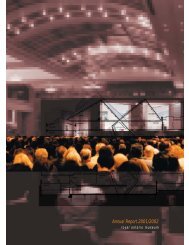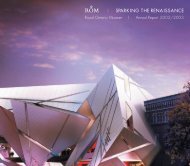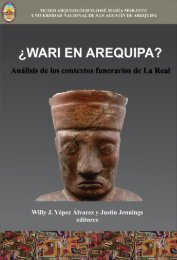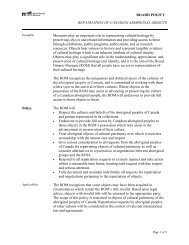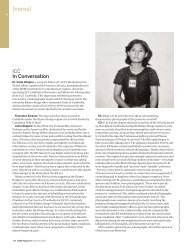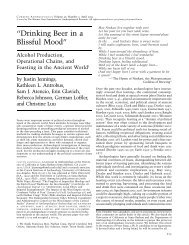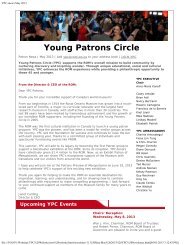ROM BOARD POLICY - Royal Ontario Museum
ROM BOARD POLICY - Royal Ontario Museum
ROM BOARD POLICY - Royal Ontario Museum
You also want an ePaper? Increase the reach of your titles
YUMPU automatically turns print PDFs into web optimized ePapers that Google loves.
<strong>BOARD</strong> <strong>POLICY</strong><br />
EDUCATION<br />
Preamble<br />
Policy<br />
Types of<br />
Educational<br />
Activities<br />
Guiding<br />
Principles<br />
The <strong>Royal</strong> <strong>Ontario</strong> <strong>Museum</strong> (<strong>ROM</strong>) is committed to the development and<br />
delivery of exhibitions, public programs, and other educational activities, in<br />
realizing its mandate to promote education and teaching of the world’s<br />
natural and cultural history. At the heart of this commitment is a belief in the<br />
role of museums as centres for life-long learning.<br />
The <strong>ROM</strong>’s educational activities are intended to<br />
• Encourage understanding of the natural and cultural heritage of <strong>Ontario</strong>,<br />
Canada, and the world.<br />
• Increase public commitment and support by making the <strong>ROM</strong> an<br />
invaluable educational resource for the community.<br />
• Make the <strong>ROM</strong> accessible to a wide and diverse audience.<br />
• Enrich visitor experience and foster collections-based learning.<br />
• Enhance the reputation of the <strong>ROM</strong> and further its stated objectives.<br />
• Promote an understanding of museums and their role in society.<br />
The <strong>ROM</strong> is committed to meeting the needs of its diverse audiences.<br />
Accordingly, it will provide a broad range of educational activities designed<br />
to reflect multiple learning styles and levels of interest. These activities<br />
include, but are not limited to, school-visits program; children’s programs;<br />
university-teaching cross-appointments; external teaching activities;<br />
lectures, classes, and seminars for adults; community tours or travel;<br />
cultural, artistic, and/or community events; galleries; interactive exhibits;<br />
and interpreters in the galleries; and use of new media and other technologybased<br />
delivery vehicles.<br />
The <strong>ROM</strong>’s educational activities will<br />
• Use the <strong>ROM</strong>’s collections and resources in a stimulating and<br />
imaginative manner.<br />
• Be accurate and current, at the point of delivery.<br />
• Incorporate relevant pedagogical practices, knowledge, attitudes, and<br />
skills.<br />
• Reflect external curricular mandates, when appropriate.<br />
• Be planned in a collaborative manner involving appropriate<br />
representatives from the external community, in addition to relevant<br />
<strong>ROM</strong> departments.<br />
• Be developed and delivered by curatorial, teaching, or appropriately<br />
qualified employees and volunteers.<br />
• Employ a combination of instructive/didactic and open-ended inquiry<br />
learning.<br />
• develop and employ new and emerging digital communication<br />
technologies to further the <strong>Museum</strong>’s educational mandate.<br />
Page 1 of 2
<strong>BOARD</strong> <strong>POLICY</strong><br />
EDUCATION<br />
Excellence in<br />
Content &<br />
Delivery<br />
Date<br />
Approved<br />
Amended<br />
The quality of educational activities will reflect the <strong>ROM</strong>’s national and<br />
international status. Accordingly, the <strong>ROM</strong> is committed to<br />
• Assessing its educational programs qualitatively and/or quantitatively.<br />
• Supporting and improving teacher performance.<br />
October 18, 2001<br />
August 29, 2002.<br />
September 6, 2007 (housekeeping changes only)<br />
June 18, 2009 (housekeeping changes only)<br />
September 30, 2010 (new language is in bold and underlined text)<br />
MONITORING<br />
Adherence to Policy<br />
Board:<br />
The Collections, Exhibitions & Research Committee will periodically review<br />
management’s adherence to the policy.<br />
Management: The Director & CEO, the Deputy Director, Operations, and the Vice-President<br />
Programs & Content Communication will ensure that the Collections, Exhibitions<br />
& Research Committee has all the relevant information for determining<br />
adherence.<br />
Policy Review<br />
Method<br />
Internal Report<br />
Responsibility Collections, Exhibitions & Research Committee<br />
Minimum Frequency Every three years (next review 2013)<br />
Page 2 of 2



